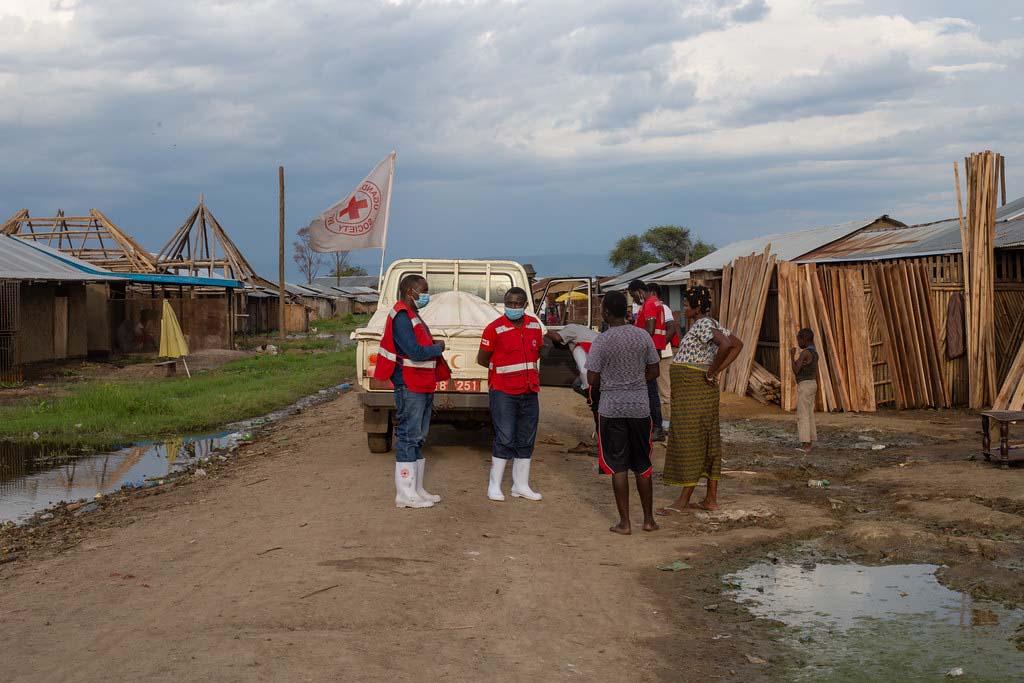The fatal flaw in Uganda’s emergency relief

The government is using national ID data to find those in need of Covid relief. Yet millions of the most marginalised aren’t even on the system.

Distributing emergency relief in Uganda amid Covid and floods in May 2020. Credit: Climate Centre.
As Uganda struggles through a strict 42-day lockdown amid a devastating new wave of COVID-19 cases, the government risks excluding many of the poorest from life-saving emergency relief. This is a human rights scandal, at the heart of which is the push to tie emergency cash transfers to the dysfunctional national digital ID, colloquially referred to as Ndaga Muntu.
President Yoweri Museveni announced a national lockdown on 18 June, in part to protect the country’s fragile health system which is under immense pressure and running out of oxygen. A few days later, Prime Minister Robinah Nabbanja said the government would provide emergency cash transfers to the most vulnerable during this health crisis. On 8 July, cash transfers started to be distributed, primarily via mobile money accounts.
Officials said that they will rely on data from the National Identification and Registration Authority (NIRA), which administers the national biometric ID, to confirm who gets support. Nabbanja made this clear in various interviews, saying in one: “It is easy to monitor MTN and Airtel [mobile money providers] – it is easy. We are going to use NIRA data. We already have most Ugandans on board, and it is easier than monitoring food.” A 29 June press release from the Ministry of Gender, Labour and Social Development also indicated people’s National Identity Number (NIN) would be used.
However, if the goal is truly to reach the most vulnerable, targeting those in need is not as easy as the Prime Minister believes – especially if the government is relying on its national digital ID system. In a damning report we released earlier this month, titled Chased Away and Left to Die, we estimated that as many as one-third of Uganda’s adult population has not yet been successfully registered with NIRA. This means that millions of people are not included in the national biometric ID and have neither a National Identity Number nor a National Identity Card.
Moreover, our research shows that it has been especially difficult for marginalised groups to successfully enrol. This includes those living in poverty, older persons, people with disabilities, women, and those living in remote areas. The result is that many of those most in need during the current crisis will be shut out of any programme that relies on data held by NIRA, an underfunded government authority that has been plagued by failures and allegations of corruption and bribery. Knowing the severe dysfunction it faces, relying on the national ID system for COVID-19 emergency relief is tantamount to criminal negligence.
This is not the first time the Ugandan government has tried to link its faltering digital ID system to efforts to curb the pandemic. This March, the government attempted to restrict access to (limitedly available) COVID-19 vaccines to people who could present their national ID card. Only after our organisations sued the government, arguing that this policy would prevent many vulnerable Ugandans from accessing the vaccine, did it relent and allow for alternative forms of identity documents to be used.
The biometric ID is already mandatory to access many government services in Uganda and our recent report recounts myriad cases of the devastating effects for those who are excluded. Bleeding pregnant women have been chased away from health centres because they could not produce an ID card. Tens of thousands of older persons over the age of 80 continue to be denied access to the Senior Citizens’ Grant, a cash transfer, because there are errors on their ID cards or they have been unable to successfully register with NIRA. Exclusion from the national ID has truly become a matter of life and death. As one interviewee told us about those being denied healthcare for failure to show the ID, “Many people fall sick and stay home and die.”
What is more, by delivering emergency cash transfers primarily via mobile accounts, the government is building extra layers of exclusion into its proposed relief efforts. In Uganda, the national digital ID is required for the registration of SIM cards, meaning that those without a national ID are also unable to use a mobile phone. And according to Uganda’s 2018 National IT Survey, only 71% of the Ugandans owned a mobile phone to begin with, a figure that was lower in rural areas and for women.
We support efforts to deliver emergency aid in these horrific times, and cash transfers are an effective tool to mitigate the effects of the pandemic-induced economic crisis. But by hinging emergency COVID-19 relief on the national digital ID system, the government risks deepening the exclusion, discrimination and other human rights issues that have plagued this system from the start. At a time when vulnerable Ugandans desperately need money to survive, the current plans are immoral and insufficient. The onus is on the government to pivot to a better, more effective plan.
We call on the Ugandan government, as well as international organisations like the World Bank and IMF who have supported emergency measures in Uganda earlier in this pandemic, to make sure that COVID-19 relief efforts do not further exclude poor and marginalised groups. The targeting of COVID relief should be transparent, and the government should be held accountable for decisions on who receives aid. If not, it is a virtual guarantee that many poor and marginalised individuals will be left to die during this harrowing phase of the pandemic.







[…] source […]
[…] vulnerable groups, are prevented from registering.A trio of rights activists and academics has written a critique of Uganda’s COVID-19 policy in African Arguments, a pan-African news analysis site, which follows […]